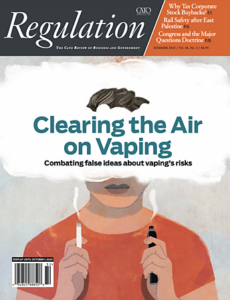The Volokh Conspiracy
Mostly law professors | Sometimes contrarian | Often libertarian | Always independent
Uneducating Americans on Vaping
Since the FDA began regulating vaping products as "tobacco" products, American ignorance about vaping's realtive risks has gotten worse.
Food and Drug Administration regulation of tobacco products is supposed to help protect public health. Yet since the FDA endeavored to regulate electronic cigarette and other vaping products through its tobacco regulation program, Americans' understanding of the relative risks posed by various types of tobacco products has gotten worse. Today fewer Americans understand that vaping poses less risk than smoking, and this ignorance could have significant consequences for public health.
In the new issue of Regulation, Jacob James Rich and I discuss this problem in our article "Uneducating Americans on Vaping." Here is how the article begins:
Cigarette smoking continues to be a leading cause of avoidable death in the United States. Nearly half a million Americans die each year from smoking‐related diseases according to the Centers for Disease Control and Prevention. Understandably, this makes reducing smoking and discouraging youth smoking significant public health priorities.
Fortunately, there are less dangerous ways for smokers to satisfy their nicotine habits than smoking cigarettes. Electronic cigarettes and other vaping products (so‐called "electronic nicotine delivery devices" or ENDS) appear to be a substantially safer substitute for combustible cigarettes. Such products can even help some smokers quit altogether. Yet too few people know this, and the ignorance appears to be getting worse.
Since the Food and Drug Administration began regulating ENDS as "tobacco products," public understanding of the relative risks of various tobacco products has declined. The FDA and many other expert authorities accept that there is a "continuum of risk" and that vaping is less dangerous than smoking. Yet, a majority of Americans do not understand this to be true. Smokers in particular do not realize there are less dangerous alternatives to combustible cigarettes—alternatives that could save their lives.
What explains widespread and worsening understanding of the relative risks of vaping? And what can be done about it? Improved messaging and public statements from public health authorities could help, but we are unconvinced such efforts would be enough. The ability of government messaging to inform consumers is inherently limited, particularly when public trust in institutions is flagging. As we explain below, educating Americans about the relative risks of tobacco products may require rethinking the way we classify and regulate such products and in particular allowing those with an economic interest in educating Americans about the relative risks of nicotine products to do so.
And our conclusion:
Public health experts are rightly concerned about the long‐term consequences of ENDS use, but leading medical journals continue to highlight the urgent need to accurately communicate to the public that these products are substantially safer to consume than conventional cigarettes. Relying upon government public health authorities to convey timely, accurate, and accessible information to consumers about the relative risks of nicotine products has failed. Americans are less informed about the relative risks of ENDS as compared to combustible cigarettes than ever before, and this lack of understanding has public health consequences.
Were ENDS manufacturers allowed to make truthful and substantiated health claims about their products, they would be free to engage in market‐driven competitive discovery of how to inform smokers of the potential health benefits of switching to their products. These incentives would also motivate the manufacturers to make their information more salient and digestible to potential customers. The existing regulatory framework and the FDA's interpretation of its own regulatory authority make such market‐driven consumer education unlawful, however. As a consequence, public health advocates are deprived of a potentially powerful tool in the campaign to reduce the health consequences of smoking.



Show Comments (14)